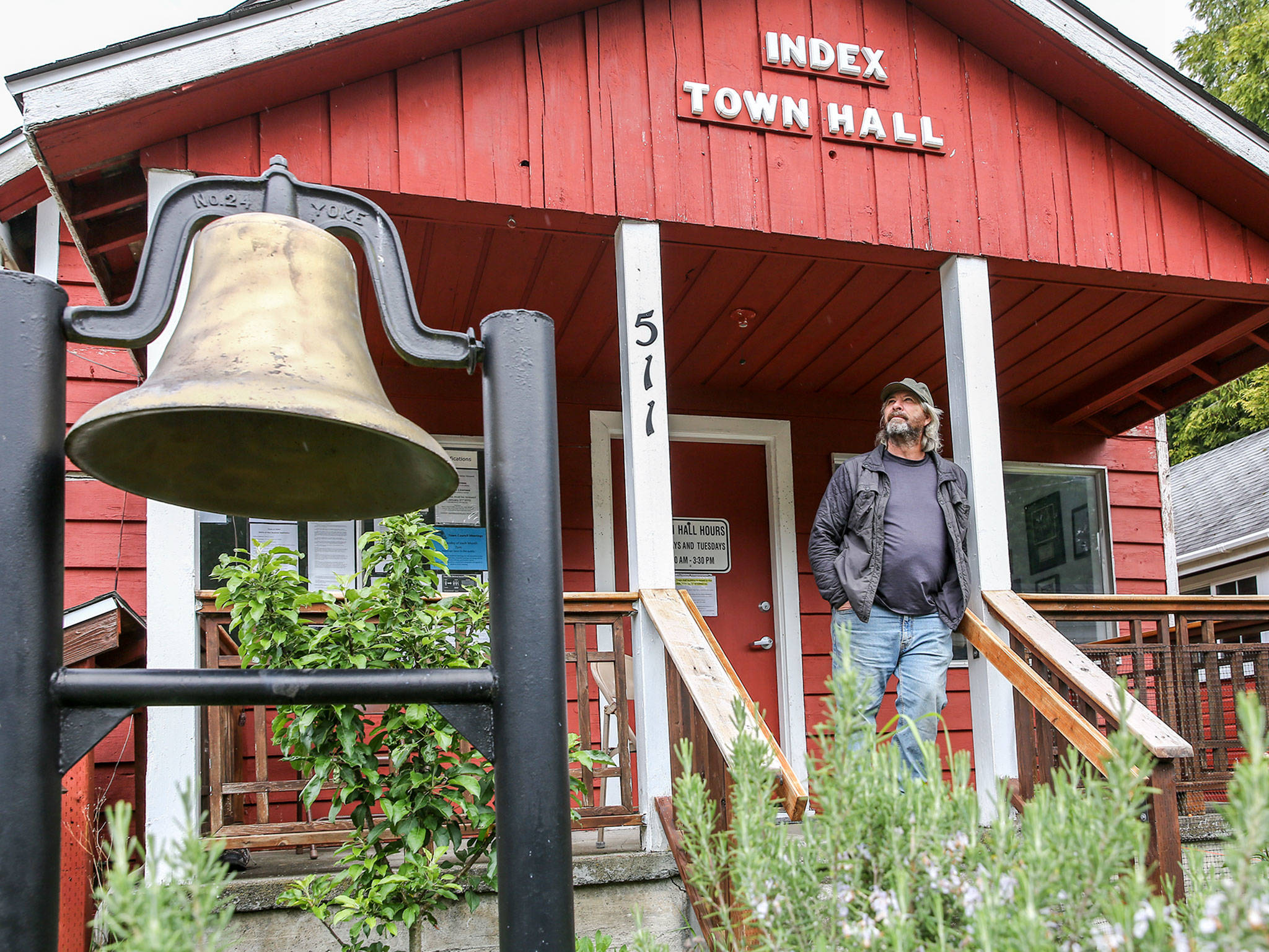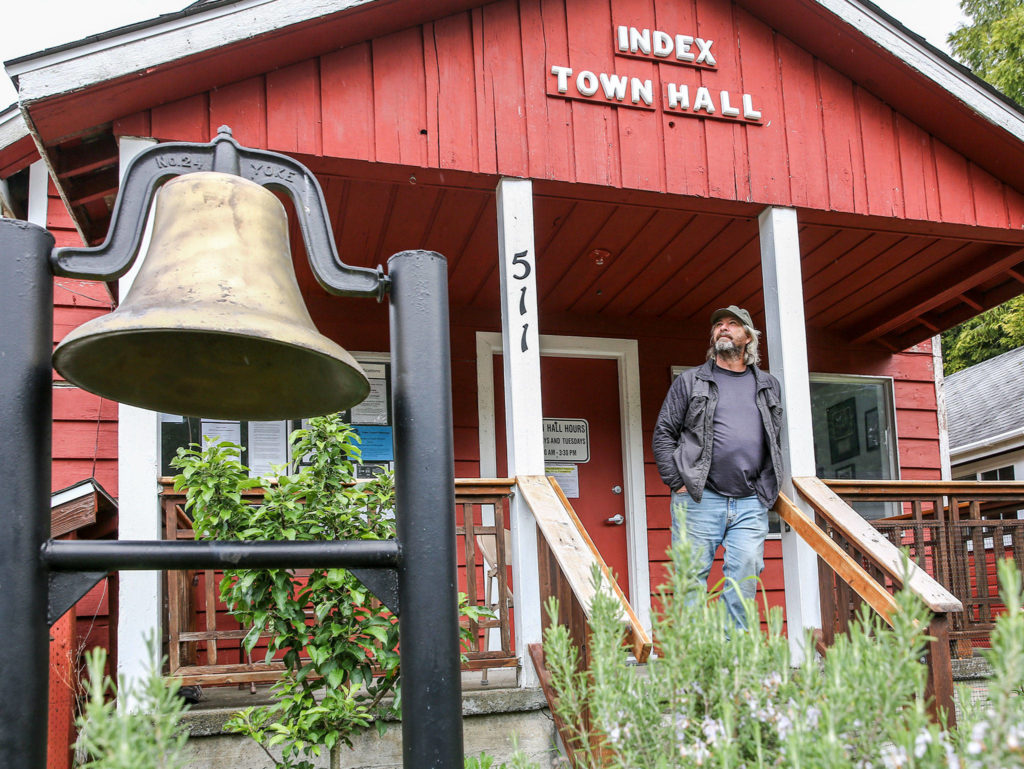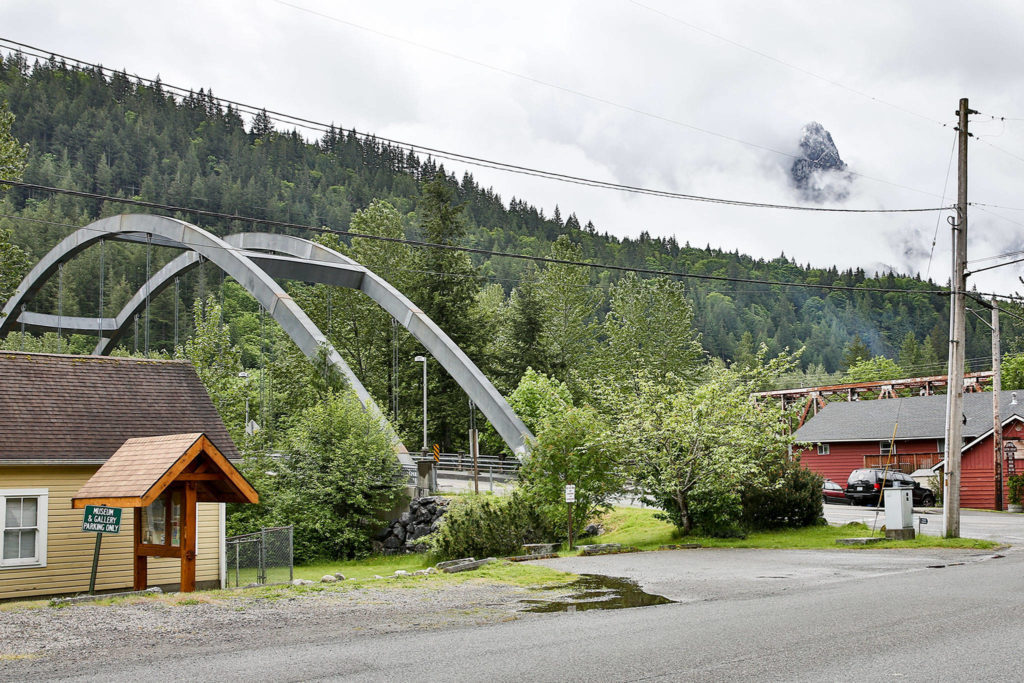INDEX — The coronavirus hasn’t changed much in the town of Index.
While the rest of Snohomish County has come to a screeching halt, the pace here has slowed subtly, if at all.
“It’s been kind of the same,” Mayor Norm Johnson said. “It’s kind of a quiet, sleepy little town.”
In the shadow of the Index Town Wall, a well-known rock-climbing destination, residents still take their daily walks to the post office that’s inside the General Store. They still ride their bikes, walk their dogs and, for the most part, keep to themselves.
“Their same daily routine,” Johnson said.
The town of about 175 people, plopped alongside the Skykomish River in the foothills of the Cascade Mountains, is the last remaining municipality in Snohomish County with zero reported COVID-19 cases.
Johnson attributes that mainly to isolation.
Many folks who live in Index are retired, health care workers or artists.
“And they don’t really leave anyway,” Johnson said. “It’s really probably not a huge change for many people.”
Johnson has been mayor for two years and has lived here for 28. Fishing and hunting first brought him out this way, and he stayed for the beauty.
“When you’re in Gold Bar, it’s like you’re looking at the mountains,” he said. “But when you come out here, it’s like you’re in them.”
On Thursday, he pulled up to the park in town with a fishing boat in the back of his pickup and the “First Dog” of Index, a border collie named Sage, at his heels.
She didn’t stick around for long. Sage took off toward the river, where sometimes she’ll find kids to throw sticks for her.
“We’re such a tight-knit community,” Johnson said as he glanced at a Honda pulled over by the park. “We all know when there’s a stranger in town.”
There’s a small minority of residents who think the town should be closed off from the outside world entirely until the pandemic blows over, he said.
Back in March, a few confrontations between residents and visitors happened in the General Store.
“Some people were saying, ‘Don’t come up here into our neck of the woods,’” Johnson said.
Store owner Yong Kim said she’s put up signs encouraging people to stay six feet apart from each other.
It’s unlikely that not a single person in Index has contracted COVID-19. It could be they just didn’t get tested, or contracted the disease but didn’t show symptoms.
Johnson thinks two families who got sick in February may have caught the virus, but they didn’t get tested.
The town has probably had three to seven cases, Snohomish Health District health officer Chris Spitters said. That’s based on a 2% to 4% prevalence rate and Index’s population.
“It is also possible that no one was infected from that area,” he said.
Aside from Index, Skykomish in King County also shows a case count of zero. Other counties track cases by census tract, rather than by city.
As Mayor Johnson walked around town Thursday, he waved at passing cars.
He headed for City Hall, where the town’s two part-time employees work.
“This is who really runs the town,” he says as Jenny Johnson emerges barefoot from the red-planked building, where she’d been working on finance reports.
Inside with her is Ruby, the “First Chicken” of Index. Ruby wears a diaper and hangs out in a play pen while she works.
“She goes around just like a little dog,” she said.
There’s no relation between Jenny Johnson and the mayor, but they often get asked about sharing a last name. There are a handful of other Johnsons in town, too.
Many Index residents are retired, so they’re not worried about being laid off, Jenny Johnson said.
Outdoor recreation isn’t a huge source of income for the town, despite the surrounding trails and rock climbing.
The Town Wall will bring 100 rock climbers to town on a nice, sunny day. But they camp, and there just aren’t many businesses for them to patronize.
There’s the General Store, the historical museum (available by appointment), the fire station, the church and Doolittle Pioneer Park.
Even though daily life hasn’t changed much for many residents, they aren’t immune to the coronavirus’ pandemic’s social and economic impacts.
On the bank of the Skykomish, The River House is part wedding venue and part outdoor recreation outfitter.
Owner Blair Corson said 90% of their revenue comes from river rafting instruction and tours from March through September. So far, he’s missing out on all of it.
“No one wants to book until at least July,” he said.
Since most of his employees are seasonal, he’s had a tough time getting small business loans from the federal government.
Mayor Johnson’s own business, a concrete contracting company, suffered a few months of loss, as well.
Earlier this month, he signed on to a letter that requested Inslee reopen the economy faster.
“I think poverty kills, too,” he said.
Index Community Christian Church Pastor Michael Netherton, the sole minister to a flock of about 20 consistent Sunday church-goers, said those who were already isolated have suffered mentally and emotionally throughout the pandemic.
“The people whose only time leaving the house was church or grocery shopping,” he said. “They miss that community, that lifeline. It starts to wear on people.”
The church hasn’t met in person for at least three months, Netherton said. He’s been preaching sermons through Facebook Live every Sunday.
For some in the congregation, it’s hard to grasp an enemy that’s existential and not physical.
“While the town may struggle with floods and snowstorms, that’s something people can understand, something they can fight through,” Netherton said. “This has been difficult for people who are on the outside and having their freedoms and rights infringed and diminished from far away.”
Corson has also seen that frustration from his patrons at The River House. About 20% of the town’s population comes for coffee in the mornings during normal times, he said.
Many of those regulars are elderly.
“Some of them said they’d rather die talking with their friends over coffee than alone in their houses,” Corson said.
Johnson is mourning his own favorite social gathering —the Arts Festival in August.
It’s the one time each year the town makes an exception for its 10 p.m. sound ordinance.
The resident maintenance man, who also has a band, takes the stage and rocks until 11 p.m.
“Everyone is out dancing in Doolittle Park,” Johnson said.
Residents agree the most visible change is the lack of parked vehicles belonging to those who have come for outdoor recreation.
On a sunny Saturday, Index’s population can sometimes double as out-of-towners camp, climb or hike.
Former mayor Bruce Albert said that traffic dropped off dramatically with the governor’s stay-home order.
A rock climber and mountaineer himself, Albert said outdoor recreation brought him to Index over 40 years ago.
Outdoor enthusiasts may soon return to Index after Mount Baker-Snoqualmie National Forest reopened most trailheads and day-use facilities on Friday.
For the most part, Albert said, visitors have been respectful and follow social-distancing guidelines. But some haven’t.
“When you see people toeing the line, there is concern about how their conduct could impact people who live here,” Albert said.
Index residents are eager to pick up the parts of their lives put on hold by COVID-19. But some are wary that as outsiders return, they could bring the coronavirus with them.
“Everybody would like things to reopen, would like their life to get back to normal socially, economically, recreationally, spiritually. I don’t think there’s a person alive who wouldn’t say they want this to be over,” Albert said. “At the same time, we don’t want to get sick.”
Julia-Grace Sanders: 425-339-3439; jgsanders@heraldnet.com.
Talk to us
> Give us your news tips.
> Send us a letter to the editor.
> More Herald contact information.



























